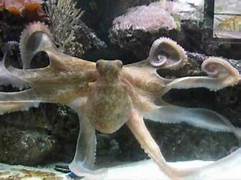Can You Keep Octopus as Pets?
Octopuses are fascinating creatures that have captured the imagination of people for centuries. With their eight arms, large eyes, and intelligent behavior, it's no wonder that some people might consider them as potential pets.

Requirements and Challenges
However, keeping an octopus as a pet is not without its challenges. These animals have specialized needs that can be difficult to meet in a home aquarium setting.
1. Large and Secure Aquarium: Octopuses require a large aquarium with plenty of space to swim and explore. The aquarium should also be escape-proof, as octopuses are known for their ability to squeeze through small openings.
2. Specialized Diet: Octopuses are carnivores and their diet consists mainly of live prey such as crabs, shrimp, and fish. Providing a consistent supply of fresh and varied live food can be challenging and expensive.
3. Water Quality: Octopuses are very sensitive to water quality and require pristine, well-oxygenated water. Maintaining the proper water parameters, including temperature, pH, and salinity, can be complex and time-consuming.
Behavioral Considerations
Besides the practical challenges, there are also ethical considerations to take into account when thinking about keeping an octopus as a pet.
1. Solitary Creatures: Octopuses are generally solitary creatures and do not form strong social bonds with humans. They may become accustomed to their keeper, but they are not likely to show affection or interact in the same way as other popular pets.
2. Short Lifespan: The lifespan of most octopus species in captivity is relatively short, ranging from a few months to a few years. This means that the bond you form with your octopus pet may be short-lived.
3. Complex Behavior: Octopuses are highly intelligent animals with complex behaviors and needs. Providing them with adequate enrichment and stimulation in captivity can be difficult and may not fully replicate their natural environment.
Conservation Concerns
Keeping octopuses as pets also raises conservation concerns.
1. Wild Populations: Many octopus species are facing population declines due to overfishing and habitat loss. Removing octopuses from the wild for the pet trade can further deplete their populations.
2. Proper Care: Ensuring that octopuses in captivity receive proper care and welfare can be challenging. Inadequate care can lead to health problems, stress, and a shortened lifespan.
Conclusion
While octopuses are captivating creatures, they are not suitable pets for most people. Their specialized needs, unique behaviors, and conservation concerns make them challenging and ethically questionable to keep in captivity. If you are interested in learning more about octopuses, consider visiting aquariums or marine research centers where you can observe these fascinating animals in their natural habitats.
Declaration: All article resources on this website, unless otherwise specified or labeled, are collected from online resources. If the content on this website infringes on the legitimate rights and interests of the original author, you can contact this website to delete it.





